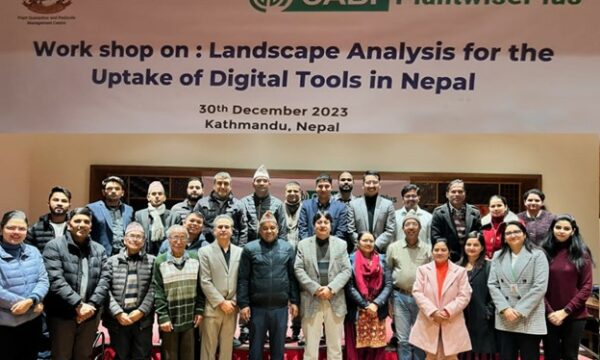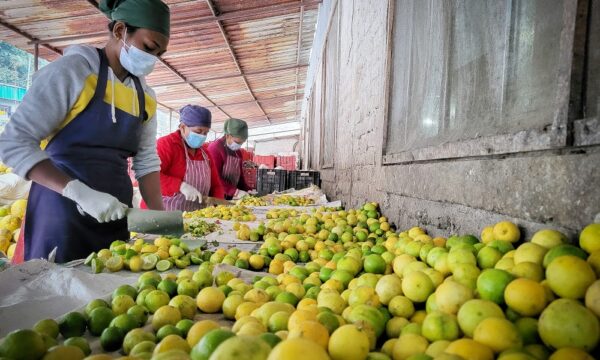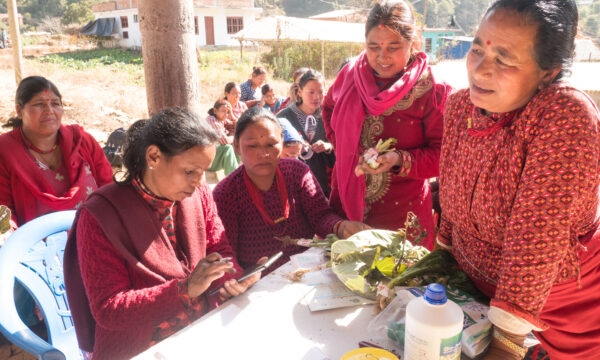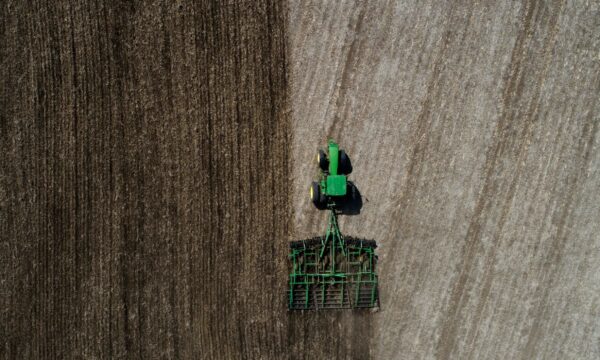
Basana Thakuri with tomato plants in Kathmandu, Nepal (Photo: Brian Sokol)
In developing countries, rural women play a significant role in agriculture, accounting for 60-80% of food production and selling food products at markets [1]. In Nepal, it’s been reported that up to 98% of women are employed in the agricultural sector, a percentage which is higher than that for men (91%) [1b]. Contribution by women is therefore critical in agriculture to achieve global food security. However, they generally don’t have the same access to land, water, seeds, training and credit than men. [2] As a consequence, in Nepal, women involvement is greater in minor and subsistence food production for crops such as millet, maize, and soybean while men are more involved in cash crops and commercial production of crops such as rice. Moreover, whilst men generally perform heavy physical labour women are involved in tedious and time-consuming work such as weeding, harvesting, threshing and milling[1].
Many studies have shown that improving the status of women, by giving them access to resources, increases agricultural productivity and therefore incomes. When women have increased incomes, they tend to spend a greater fraction of their finances on their children’s health and nutrition.

Nepali woman receiving advice from a plant doctor (Photo: CABI)
According to USAID, in 2011 an estimated 10% of Nepali men were employed abroad, leaving more women in charge of the household and farms. This phenomenon, called “feminization of agriculture”, has created challenges, but also new opportunities for women in rural areas. For example, in Nepal it has been reported that a women’s cooperative grows and harvests lemongrass and citronella to produce essential oils which allows them to access export markets [2]. Benefitting from various projects [2,3,4,5,6], Nepali women were given training opportunities to switch from subsistence food crops to high-value vegetables (aubergines, tomatoes, cucumber and lettuce) and export crops (ginger and essential oils) to increase family incomes. As a direct impact, women are more confident in managing the household finances and discussing family decisions. With the savings, some women were even able to buy or lease more lands and run production systems.
However, working for the family as well as working on the farm is extremely tough for women. An IFAD study found that women in Nepalese hill districts had worked for about 16 hours per day compared to only 9-10 hours for men; they were overworked and hungry [1c]. In Nepal, it has also been reported that adult literacy rates of women are particularly low for Asia. Not only that, there is a lack in progress in improving female literacy when compared to men [1b]. This is particularly concerning when considering feminization of agriculture since rural women need to be able to deal with challenges presented by the agricultural economy and competitive global market.

Women farmers attending a plant clinic session in Nepal (Photo: CABI)
As part of our objectives of 2017, we’ll work closely with country teams and Plantwise partners to identify the needs and interests of women farmers. Using this information, we’ll work together to develop extension materials for the crops women grow. We’ll also work to identify the appropriate means to reach them, finding working groups for women that we can approach and being aware of cultural factors (e.g. restriction of movement outside the home [1b]) that may influence attendance levels of women at clinic sessions and plant health rallies. Moreover, we’ll address not only women’s needs and interests but we’ll also make sure that the information reaching them is gender-responsive (i.e. adapted to women). By providing gender-responsive recommendations, such as those which are not too physically demanding and minimise time spent in the field, Plantwise ensures that the advice is practical, accessible and affordable for women to implement and adopt it.
As Plantwise is running an e-Plant clinic training this week in Nepal, we thought we’d highlight the work of Nepali women in extension services. Even if only 22 out of 157 of the plant doctors in Nepal are women (14%), female plant doctors are essential since women seeking advice are often more comfortable talking to other women, to the extent to which it may determine whether they visit a plant clinic. Over the past year we’ve had more females than males attending plant clinics in Nepal (55% women compared to 45% men) which is a great indicator that female farmers are engaged with the clinics.

e-Plant Clinic training in Kathmandu, Nepal. Plant doctors receiving their tablets and certificates (Photo: CABI)
Written by Léna Durocher-Granger and Kate Dey
References
[1] FAO 2010. Integration of Gender in Agriculture: An Analysis of Situation. UN Complex, Pulchowk, Nepal.
[1b] FAO 2005. Rural women and food security in Asia and the Pacific: Prospects and paradoxes. RAP Publication 2005/30. ftp://ftp.fao.org/docrep/fao/008/af348e/af348e00.pdf
[1c] IFAD 1999. Nepal: Factors that increase women’s workloads. https://www.ifad.org/topic/tools/tags/gender/gender/knowledge_note/2593554)
[2] USAID Nepal 2013. Women In Agriculture: Calendar 2013. https://www.usaid.gov/sites/default/files/documents/1861/USAID_Nepal_calendar_2013_downsized.pdf
[3] Her Farm Nepal 2017. http://herfarmnepal.org
[4] Mercy Corps 2017. Nepal Ginger Farming. https://www.mercycorps.org/nepal-ginger-farming
[5] OXFAM. The Women Climate Fighters of Nepal, Krishnaa Budha: Water that Changes the Village. http://www.oxfamblogs.org/asia/the-women-climate-fighters-of-nepal/
[6] Empower Dalit Women of Nepal 2012. Breaking New Ground. http://www.edwon.org/success_story/breaking-new-ground/
Related News & Blogs
CABI shares important new evidence on the legacy of Plantwise
A plant doctor works with a local farmer in Jamaica (© CABI) CABI has published a working paper assessing the legacy of Plantwise programmes in six countries: Nepal, Pakistan, Ghana, Kenya, Malawi, and Jamaica. The paper, entitled Plantwise Sustainabil…
20 February 2024




